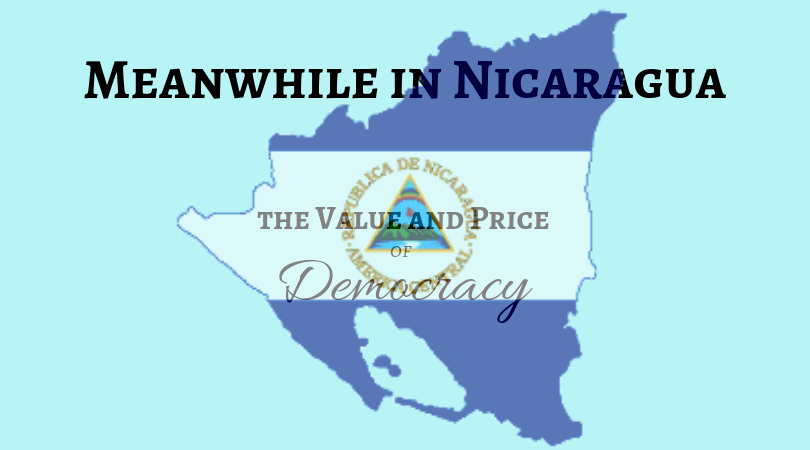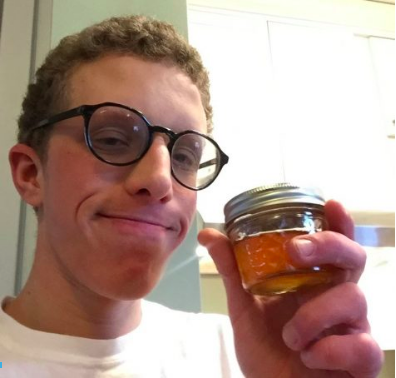Meanwhile in Nicaragua
October 29, 2018
As our country tears itself apart over a myriad of issues so numerous as to be beyond counting, so polarizing as to be beyond the pale of discussion, and so all-encompassing as to distract from all else, it can be difficult to step back and remember how lucky we all are to live in the United States of America, a functional democracy where political rights and civil liberties are held sacrosanct.
The people of Nicaragua, for example, are some of the billions of human beings who live without the freedoms enshrined in our Constitution and Bill of Rights. Under President Daniel Ortega, Nicaraguans have been imprisoned on accusations of terrorism and held in locations unknown to their families. Protests demanding that he step down as President have been broken up by violent action of the military police. Abductions and disappearances are becoming all too common in Ortega’s Nicaragua, which has murdered well over 30 people, including several journalists covering protests against the President, and deported many others.
Despite the terrible risks they face – imprisonment, exile, or even death – the Nicaraguan people are not backing down. Though the most energetic of protests may have subsided, brave and self-sacrificing Nicaraguans are risking their lives in the hope of restoring Nicaragua’s democracy. They may fail or they may succeed, but they are making the attempt.
The same thing is happening all over the world, as Turkey veers into authoritarianism, Venezuela progresses toward outright civil war, and Syria bombs its own people with chemical weapons. Everywhere, democracy and domestic tranquility are on the defensive.
Compare that to the political situation in our United States. We live in a time of incredible polarization; only a few other times saw the country this divided, one of which was the Civil War. If you don’t remember, the Civil War saw 3% of the population killed (equivalent to about 10 million people today) and the near-total destruction of Southern infrastructure. Even if we dodge that bullet, the current political polarization is a hindrance to America’s ability to present a unified face to the world.
And yet, we, as a country, are not doing anything. The recent Kavanaugh vote only goes to show how easily divided we are into Republicans and Democrats and how clear the battle lines are between the two parties. Rather than seeking dialogue and civil discussion, we are insisting on the fundamental rightness of our respective opinions.
Both parties are guilty of this. The Republicans refused to even hear the case of one of Obama’s Supreme Court nominees and then had the gall to accuse the Democrats of perpetrating the “most unethical sham since I’ve been in politics,” in the words of Senator Lindsey Graham, when the Democrats questioned Justice Kavanaugh. The Democrats, for their part, forced the Affordable Care Act on the nation back in 2010 with little to no input from the Republicans.
None of this should have happened. Democracies are not supposed to work like this, filled with partisan vitriol. President Washington went so far as to explicitly warn us about this sort of squabbling in his Farewell Address. We ignored him, and now we are all paying the price.
Our political norms have gone beyond the pale, and we are all responsible for allowing that to happen. But we are refusing to do anything about it.
Democracy is not easy. It never was and it never will be; just ask the Nicaraguans fighting in the streets, the Russian democracy advocates assassinated by Putin, the Tiananmen Square protesters mowed down by Chinese tanks, the Arab Spring activists brutally murdered by autocrats across the Middle East, and everyone else who has fought for democracy.
But America made a promise back in 1945. After seeing dictators inundate the world with blood and chaos, we would commit to upholding democracy in the name of global stability.
Long years have passed since then, but we have done our best to protect democracy at home and abroad. There have been protests, and wars, and nuclear crises, but through it all we have done our best.
Times have changed. Most of the population fails to vote in midterms; it seems as if only radicals continue to do so in large numbers. The government is locked in hyper-partisan gridlock by the hyper-polarized electorate. If we want our democracy to function, we need to start voting.
More importantly, our democracy needs an injection of energy and new life. We need more protests. We need more citizens barging into Congress and heckling the representatives. We need more people in the House of Representatives, which was last expanded when the U.S. population was less than a third of what it is today. We need to take control of the presidential election away from a bunch of unelected, faceless electors. We need to be able recall to our representatives from Congress when they vote in a way we don’t like. Otherwise the current fiascoes will be just a taste of what is in store as the government becomes less and less beholden to the people.
Democracy is something worth fighting for, as the Nicaraguans are showing us. Let us therefore go forward resolved to kick, scream, impeach people, write strongly worded emails to our representatives, protest and blockade Congress inside the Capitol until they put aside their petty partisan squabbles and begin building a stronger, safer, more consensual democracy that works for every American. This is not a liberal or conservative idea. This is not a call to anarchy. This is a concept steeped in America’s traditions of rule of law and democratic governance.
Building a more functional democracy is hard, and the going will be tough indeed as the country shakes itself into the new system.
But this is the United States of America, the arsenal of democracy and birthplace of the Reuben. Just to say we did it, we landed a dozen people on the moon in a span of three years. Fear of tough going has not deterred us before, as witnessed by the motto of Kansas — ad astra per aspera, to the stars through difficulties — and we should not let it deter us in the future.
There are those who will say that it is too late to repair our democracy. There are those who will say that we aren’t cut out for this. There are those who will look at the current situation, shake their heads, and move to Canada. I’ll let the immortal words of J.R.R. Tolkien answer them.
“So do all who live to see such times. But that is not for them to decide. All we have to do is what to do with the time that is given us.”







